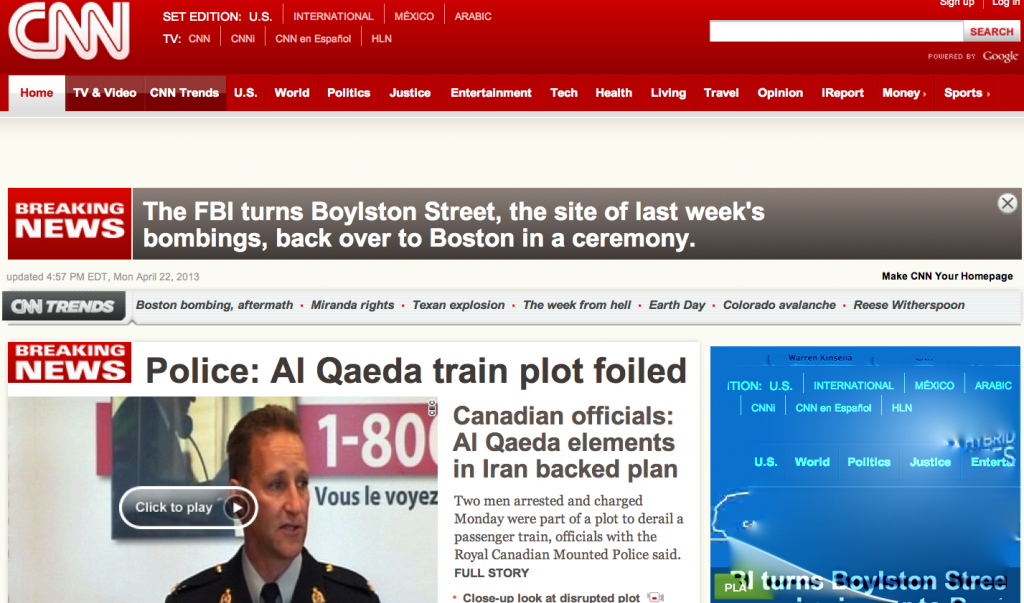What’s amazing about the Conservative Party’s Justin Trudeau advertising isn’t their content, or their tone, or their mere existence.
Some of us predicted (a) the anti-Trudeau attacks were coming and (b) the Cons would target his life (in)experience. And so they have.
No, what is amazing is how Liberal partisans, and Trudeau himself, reacted to them.
The two spots themselves will prove to be effective, of course. They’re well done. Both have a sarcastic, biting tone, like all the best negative political ads do. Both contain cited Trudeau statements that legitimize the spots’ main critique, namely that he lacks the right judgment and experience. And both make extensive use of Trudeau stripping his shirt off for a charity — a reaction that prompted one friend to say: “I can’t unsee that, now.”
TV is a visual medium, so pictures matter more than words. That’s why so many people have reacted so strongly to the liver cancer charity striptease segment (for which Trudeau raised thousands, by the by, and for which Stephen Harper’s wife has also lent support). Whatever the context, whatever the motivation, Trudeau’s decision to remove his shirt for the cameras will indeed leave some voters wondering whether that is, you know, the behaviour of a prime minister.
The newly minted Liberal leader may look terrific, and possess impressive pipes.
But the fact remains, if you were to ask them (and you can bet the Conservatives did, in coast-to-coast focus grouping), lots of Canadians will likely say they do not want the nation’s leader cavorting like Channing Tatum in Magic Mike.
That said, the poison at the centre of the attacks is not the striptease stuff, nor Trudeau’s Pirates of the Caribbean-style facial hair, nor the snide references to his job experience (a “drama teacher,” the narrator sneers, as if drama teachers are somehow less reputable than Justin Bieber).
What is potentially lethal is the ancient, and out-of-context, quote of Trudeau saying these words: “Quebecers are better than the rest of Canada because we’re Quebecers.”
Those words — uttered before CTV News cameras in 1999 — are deadly. They dramatically buttress the notion that has been at the centre of the Conservatives’ anti-Trudeau narrative for months: That he puts Quebec before Canada. That he, like Stephane Dion, like Michael Ignatieff, owes allegiance to another place, and not Canada first.
It worked in 2008 and 2011; it can work again.
If the Conservatives’ spots are backed by a substantial media buy, then, they will make Trudeau less popular. But Trudeau stubbornly refuses to fight fire with fire. And, like Dion and Ignatieff before him, he is letting the Conservatives define him with non-Liberals before he can define himself.
When asked about the attacks on his first day on the job, Trudeau gave a Trudeau-esque shrug. Canadians are “tired of negativity,” he said.
No, actually, they’re not. Canadians, like voters everywhere, may express a lack of enthusiasm for so-called negative advertising. But the fact remains, mountains of studies have shown that such advertising works. It is the advocacy that voters tend to recall the most, as they head to the ballot box. It is the type of advocacy that has been shown to most affect citizens’ hearts and minds.
The reaction in the mainstream media, and on the Internet, was largely the same as Trudeau’s. Commentators claimed Harper’s ads will backfire, and no sensible person will heed them.
If they look back, these commentators will see they said the same thing when the anti-Dion and anti-Ignatieff barrages started, too. They were wrong then, and they’re wrong now.
Should we aspire to live in a world where such advertising doesn’t work? Of course.
But we don’t live in such a world.
As I always say: No one likes car crashes, either.
But they always slow down to have a look.
Comments (76)

